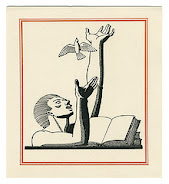~ p. 7: "To divorce the theory from the practice, to set the scholar against the practitioner as has happened in other disciplines, would be tragic indeed."
~ p. 9: "the arrogant way in which critics will define a translation as good or bad from a purely monolingual position again indicates the peculiar position occupied by translation vis-à-vis another type of metatext (a work derived from, or containing another existing text), literary criticism itself."
~ p. 9: "It is pointless, therefore, to argue for a definitive translation, since translation is intimately tied up with the context in which it is made."
~ p. 13: Translation "belongs most properly to semiotics".
~ p. 14: "In the same way that the surgeon, operating on the heart, cannot neglect the body that surrounds it, so the translator treats the text in isolation from the culture at his peril."
~ p. 16: Translation as an act of decoding and recoding... Maybe I could compare Percy's triadic theory of meaning to translation?
~ p. 32: examining both linguistic and cultural untranslatability (words vs. concepts)
~ p. 37: "The purpose of tranlsation theory, then, is to reach an understanding of the processes undertaken in the act of translation and, not, as is so commonly misunderstood, to provide a set of norms for effecting the perfect translation. In the same way, literary criticism does not seek to provide a set of instructions for producing the ultimate poem or novel, but rather to understand the internal and external structures operating within and around a work of art." (Well, that's the idea anyway...)
~ p. 38: Bassnett quoting from a translated edition of Octavio Paz's Traducción: literatura y literalidad:
Every text is unique and, at the same time, it is the translation of another text. No text is entirely original because language itself, in its essence, is already a translation: firstly, of the non-verbal world and secondly, since every sign and every phrase is the translation of another sign and another phrase. However, this argument can be turned around without losing any of its validity: all texts are original because every translation is distinctive. Every translation, up to a certain point, is an invention and as such it constitutes a unique text.~ pp. 43-44: "Both Horace and Cicero, in their remarks on translation, make an important distinction between word for word translation and sense for sense (or figure for figure) translation. The underlying principle of enriching their native language and literature through translation leads to a stress on the aesthetic criteria of the TL product rather than on more rigid notions of 'fidelity'."
~ p. 52: "Translation acquired an additional dimension, as writers used their abilities to translate as a means of increasing the status of their own vernacular. Thus the Roman model of enrichment through translation developed in a new form."
~ p. 56: begins to examine translations of Petrarch by Wyatt and Surrey
~ p. 66: "If poetry is perceived as a separate entity from language, how can it be translated unless it is assumed that the translator is able to read between the words of the original and hence reproduce the text-behind-the-text; what Mallarmé would later elaborate as the text of silence and spaces?"
~ p. 79: "The reader, then, translates or decodes the text according to a different set of systems and the idea of the one 'correct' reading is dissolved. At the same time, Kristeva's notion of intertextuality, that sees all texts linked to all other texts because no text can ever be completely free of those texts that precede and surround it, is also profoundly significant for the student of translation."
~ p. 83: "Pound defined his Homage as something other than a translation; his purpose in writing the poem, he claimed, was to bring a dead man to life. It was, in short, a kind of literary resurrection."
~ p. 98: Bassnett does a fascinating parallel analysis of translations by Ezra Pound and Charles Kennedy of The Seafarer.
~ p. 110: In discussing how some treat the translation of novels differently from that of poetry, she says that "a different concept of the imaginary distinction between form and content prevails when the text to be considered is a novel. It seems to be easier for the (careless) prose translator to consider content as separable from form"--when, of course, this is not really the case.
~ pp. 115-16: "Again and again translators of novels take pains to create readable TL texts, avoiding the stilted effect that can follow from adhering too closely to SL syntactical structures, but fail to consider the way in which individual sentences form part of the total structure." She judges this "a deficiency in reading" and suggests that this is "a whole area of translation that needs to be looked at more closely."
~ p. 116-17: Hilaire Belloc's "six general rules for the translator of prose texts" are listed and explained.
~ p. 118: "Every prime text is made up of a series of interlocking systems, each of which has a determinable function in relation to the whole, and it is the task of the translator to apprehend these functions."
~ p. 119: "What the translator must do, therefore, is to first determine the function of the SL system and then to find a TL system that will adequately render that function."

